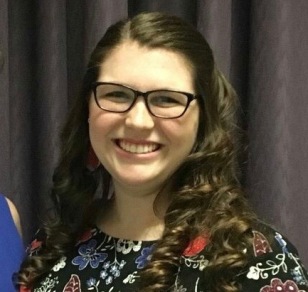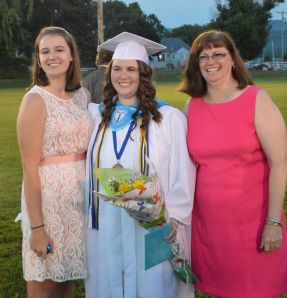My name is Mattie Whitman and I am a senior Sociology major at Siena College. My hometown is Petersburgh, New York. I am who I am today because of how my parents  raised me to be independent and hardworking, while always being appreciative of what I have in life.
raised me to be independent and hardworking, while always being appreciative of what I have in life.
Both of my parents were raised in small town, mostly agricultural, communities. My father was born in 1949 and my mother in 1962, a historical time known as the baby boom. My father has four brothers and sisters, while my mother is number six of eight children. Both sets of my grandparents were a part of the breadwinner-homemaker family where the father was employed while the mother was unemployed (Cohen 2015:17). In my grandparents’ time, there was a clear division in gender roles that were not usually challenged.
It was not until the 196os and the 1st modernity that things started changing. Most of my aunts and uncles, by this time, were born and were getting jobs and starting their professional lives. Later, most of my mother’s siblings bucked the social norm and had children out of wedlock and prior to graduating high school. This made my mother’s home a multigenerational household where my cousins were being raised not only by their parents, but by my grandparents and aunts and uncles as well. The multigenerational household created an atmosphere of closeness that has yet to disappear.
My father’s family was a bit more on the traditional side. My dad was raised by two Roman Catholics. My grandfather was a farmer by trade at this time and had come from a long line of farmers. My grandmother came from a more well-to-do family from right here in Latham. Both of my grandparents believed in having their children receive a catholic education as well as working. My father and his brothers were working on the family farm by the time that they were seven years old. Because religion was an important part of his life, my father decided after high school to go into the seminary to become a priest. While there for two years, he found that some of the catholic teachings he could not believe in. He left the seminary and took a job as a mechanic at Adirondack Beverages, Inc. while starting his own farm. This left him with only about two years worth of post high-school graduation, which is 26% of the baby boomer population.
My mother is an elementary school teacher, meaning that she was the real breadwinner of our immediate family. She had gotten her bachelor’s and master’s degree from the College of Saint Rose. Already the difference in wages between my parents made my family a little different. It took me until I was in high school to understand that men generally make more money than women and that men are “supposed” to be the main money maker of a family. That being said, when my father passed away it was not hard to think of my mother as the head of the household. In 2015, over 80% of the single parent households were headed by women. This shows that now single parent households are very common. The power of the mother or father is still reinforced by single parent households but there is not a split of power.
Since my father died, I became more than a sibling to my younger sister. My power in our family increased because of the need to have another person have more responsibility within our three person family.

Based on Parent.com’s description of firstborns, I am reliable, conscientious, and structured. All true. Using the life course perspective, I can assume that one of my children will exhibit the same traits as myself because I am very much like my mother (Cohen 2015:23). Even though she was not a firstborn, she is one of the gap children mentioned in the Parent.com article, exhibiting firstborn characteristics. My mother’s grandchildren will exhibit similar traits as her but perhaps in different ways depending on how my sister and I decide to raise our children.
There are stark differences between my grandparents’ lifetime and mine. The average family income in the 1960s was $5700 compared to $53,657 in 2014. Not only have incomes changed, but also our family structure. Both sets of my grandparents were married for more than 50 years, had children before the age of 22, and lived well into their seventies. My mother became a widow in her mid-forties and had two children later in life. My mother is now engaged and we are slowly creating our own personal family (Cohen 2015:6).

I enjoy reading and spending time with my family and friends. I work as an office assistant part time at pediatrician’s office and I absolutely love it. The job started off with me scanning patient paper charts into a new electronic health record to working the front desk while answering phones and scheduling appointments. Around campus, I am a Resident Assistant in Hennepin Hall. I thoroughly enjoy the community that I am a part of in this building, as the staff members are most of my best friends and the residents keep me on my toes. The RA job lets me be independent while requiring me to be on top of my game all the time and is constantly putting me out of my comfort zone.
References:
Cohen, Philip N. 2015. The Family: Diversity, Inequality, and Social Change. New York: W.W. Norton & Company.
http://www.history.com/topics/baby-boomers
Click to access mmi-older-boomer-demographic-profile.pdf
https://singlemotherguide.com/single-mother-statistics/
http://www.parents.com/baby/development/social/birth-order-and-personality/
Hi, Mattie! My name is Deanna Boden, I am so also a senior here at Siena college. I find it interesting that your dad is a baby boomer because mine is too! I do not find many people our age who have a father that was born during this time. I also find your realization about the salary of men and women interesting. Given my mother was the one that worked when I was younger, it was a surprise to me when I found out that men, according to society, are supposed to be making more money than women. The life course perspective is an interesting take on the nature vs nurture debate. I believe nurture plays a big role in how children become the adults they are, and I am lucky to see myself start to become my mother.
LikeLike
Hi Mattie! My name is Meghan Hodson and I am also a senior at Siena. I can relate to your description of how your grandparents’ family was the traditional model of the male being the breadwinner, while the female was meant to stay at home. My grandparents were similar as my grandpa would travel all around to find work, as my grandma stayed home with the four children. Like your current immediate family, my family has also changed from this traditional model as both of my parents worked for a steady income. My sisters and I also plan on pursuing competitive careers rather than being solely a homemaker.
LikeLike
Hey Mattie,
I thought it was really interesting that you pointed out the differences in your grandparent’s lifestyles back then to yours now. I think about this a lot too in terms of marriage, because my grandparents got married at such a young age, and this seems to have been the trend back then. People seem to be getting married later today. My grand parents got married around the same age that I am now (21), and I don’t feel anywhere close to taking that step in my life yet. It’s really interesting how common/uncommon these trends become in families as time progresses, and the reason one might make these decisions, given the current societal/economic climate.
LikeLike